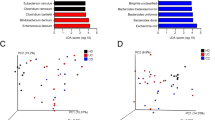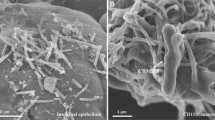Abstract
Background
Dysbiosis of gut microbiota promotes colitis in ulcerative colitis (UC). Enterococcus faecium is an important constituent of dysbiotic microbiota. However, the mechanisms underlying E. faecium-induced colitis remain unclear.
Methods
Overall, 23 E. faecium strains isolated from human feces and 3 commercial strains were inoculated into Il10−/− mice. Mouse colons were histologically evaluated and analyzed using real-time PCR analysis of cytokines. Genes in 26 E. faecium strains were identified by whole-genome shotgun sequencing of genomic DNA. The production of reactive oxygen species (ROS) from each strain was measured. An antioxidant, lipoic acid, was orally administered to the colitis mouse model.
Results
Inoculation of E. faecium derived from patients with UC resulted in colitis in Il10−/− mice. The genotypes of 26 strains were characterized by identifying 1893 known genes; clustering all the strains based on the genotypes showed two major groups—inflammatory and probiotic clusters. Additionally, linear discriminant analysis clarified that lipoic acid metabolism was a significantly abundant pathway in the probiotic cluster compared to the inflammatory cluster. Further, the production of ROS was greater in inflammatory than in probiotic strains. Administration of lipoic acid in E. faecium-inoculated mice ameliorated colitis.
Conclusions
Enterococcus faecium strains in the inflammatory cluster promoted colitis with higher production of ROS than the strains in the probiotic cluster.







Similar content being viewed by others
References
Loftus EV. Clinical epidemiology of inflammatory bowel disease: incidence, prevalence, and environmental influences. Gastroenterology. 2004;126:1504–17.
Kostic AD, Xavier RJ, Gevers D. The microbiome in inflammatory bowel disease: current status and the future ahead. Gastroenterology. 2014;146:1489–99.
Ananthakrishnan AN, Khalili H, Konijeti GG, et al. A prospective study of long-term intake of dietary fiber and risk of Crohn’s disease and ulcerative colitis. Gastroenterology. 2013;145:970–7.
Rodríguez LAG, Ruigómez A, Panés J. Acute gastroenteritis is followed by an increased risk of inflammatory bowel disease. Gastroenterology. 2006;130:1588–94.
Porter CK, Tribble DR, Aliaga PA, et al. Infectious gastroenteritis and risk of develo** inflammatory bowel disease. Gastroenterology. 2008;135:781–6.
Small CL, **ng L, McPhee JB, et al. Acute infectious gastroenteritis potentiates a Crohn’s disease pathobiont to fuel ongoing inflammation in the post-infectious period. PLoS Pathog. 2016;12:1–20.
Elhenawy W, Tsai CN, Coombes BK. Host-specific adaptive diversification of Crohn’s disease-associated adherent-invasive Escherichia coli. Cell Host Microbe. 2019;25:301-312.e5.
Chow J, Tang H, Mazmanian SK. Pathobionts of the gastrointestinal microbiota and inflammatory disease. Curr Opin Immunol. 2011;23:473–80.
Seksik P, Rigottier-Gois L, Gramet G, et al. Alterations of the dominant faecal bacterial groups in patients with Crohn’s disease of the colon. Gut. 2003;52:237–42.
Morgan XC, Tickle TL, Sokol H, et al. Dysfunction of the intestinal microbiome in inflammatory bowel disease and treatment. Genome Biol. 2012;13:R79.
Bouma G, Strober W. The immunological and genetic basis of inflammatory bowel disease. Nat Rev Immunol. 2003;3:521–33.
García-Solache M, Rice LB. The Enterococcus: a model of adaptability to its environment. Clin Microbiol Rev. 2019;32:1–28.
Seishima J, Iida N, Kitamura K, et al. Gut-derived Enterococcus faecium from ulcerative colitis patients promotes colitis in a genetically susceptible mouse host. Genome Biol. 2019;20:1–18.
Schmieder R, Edwards R. Quality control and preprocessing of metagenomic datasets. Bioinformatics. 2011;27:863–4.
Bankevich A, Nurk S, Antipov D, et al. SPAdes: a new genome assembly algorithm and its applications to single-cell sequencing. J Comput Biol. 2012;19:455–77.
Prokka ST. Rapid prokaryotic genome annotation. Bioinformatics. 2014;30:2068–9.
Sturn A, Quackenbush J. 2002—bioinformatics applications note.pdf. 2002;18:207–8.
Abubucker S, Segata N, Goll J, et al. Metabolic reconstruction for metagenomic data and its application to the human microbiome. PLoS Comput Biol. 2012;8:e1002358.
Buchfink B, **e C, Huson DH. Fast and sensitive protein alignment using DIAMOND. Nat Methods. 2014;12:59–60.
Segata N, Izard J, Waldron L, et al. Segata-LEfSe-gb-2011. 2011.
Iida N, Nakamoto Y, Baba T, et al. Antitumor effect after radiofrequency ablation of murine hepatoma is augmented by an active variant of CC chemokine ligand 3/macrophage inflammatory protein-1á. Can Res. 2010;70:6556–65.
Burich A, Hershberg R, Waggie KIM, et al. Helicobacter-induced inflammatory bowel disease in IL-10- and T cell-deficient mice. Am J Physiol Gastrointest Liver Physiol. 2001;281:G764–78.
Ka**o-Sakamoto R, Omori E, Nighot PK, et al. TGF-β-activated kinase 1 signaling maintains intestinal integrity by preventing accumulation of reactive oxygen species in the intestinal epithelium. J Immunol. 2010;185:4729–37.
Wang H, Nicolay BN, Chick JM, et al. The metabolic function of cyclin D3-CDK6 kinase in cancer cell survival. Nature. 2017;546:426–30.
Uraz S, Tahan G, Aytekin H, et al. N-acetylcysteine expresses powerful anti-inflammatory and antioxidant activities resulting in complete improvement of acetic acid-induced colitis in rats. Scand J Clin Lab Invest. 2013;73:61–6.
Moeinian M, Abdolghaffari AH, Nikfar S, et al. Effects of alpha lipoic acid and its derivative “andrographolid-lipoic acid-1” on ulcerative colitis: a systematic review with meta-analysis of animal studies. J Cell Biochem. 2019;120:4766–82.
Golińska E, Tomusiak A, Gosiewski T, et al. Virulence factors of Enterococcus strains isolated from patients with inflammatory bowel disease. World J Gastroenterol. 2013;19:3562–72.
Pony P, Rapisarda C, Terradot L, et al. Filamentation of the bacterial bi-functional alcohol/aldehyde dehydrogenase AdhE is essential for substrate channeling and enzymatic regulation. Nat Commun. 2020;11:1426.
Campbell EL, Colgan SP. Control and dysregulation of redox signalling in the gastrointestinal tract. Nat Rev Gastroenterol Hepatol. 2019;16:106–20.
Biasi F, Leonarduzzi G, Oteiza PI, et al. Inflammatory bowel disease: mechanisms, redox considerations, and therapeutic targets. Antioxid Redox Signal. 2013;19:1711–47.
Wang X, Huycke MM. Extracellular superoxide production by Enterococcus faecalis promotes chromosomal instability in mammalian cells. Gastroenterology. 2007;132:551–61.
Hirschfeld J, White PC, Milward MR, et al. Modulation of neutrophil extracellular trap and reactive oxygen species release by periodontal bacteria. Infect Immun. 2017;85:1–14.
McBee ME, Chionh YH, Sharaf ML, et al. Production of superoxide in bacteria is stress- and cell state-dependent: a gating-optimized flow cytometry method that minimizes ROS measurement artifacts with fluorescent dyes. Front Microbiol. 2017;8:1–17.
Huycke MM, Abrams V, Moore DR. Enterococcus faecalis produces extracellular superoxide and hydrogen peroxide that damages colonic epithelial cell DNA. Carcinogenesis. 2002;23:529–36.
Akhter N, Wilson A, Thomas R, et al. ROS/TNF-α crosstalk triggers the expression of IL-8 and MCP-1 in human monocytic THP-1 cells via the NF-κB and ERK1/2 mediated signaling. Int J Mol Sci. 2021;22:10519.
Grayczyk JP, Alonzo F. Staphylococcus aureus lipoic acid synthesis limits macrophage reactive oxygen and nitrogen species production to promote survival during infection. Infect Immun. 2019;87:1–16.
Gonçalves NS, Ghaem-Maghami M, Monteleone G, et al. Critical role for tumor necrosis factor alpha in controlling the number of lumenal pathogenic bacteria and immunopathology in infectious colitis. Infect Immun. 2001;69:6651–9.
Acknowledgements
The authors thank Ms. Akiko Katayama (Kanazawa University) and Katsumi Hara for assistance with histological analysis; Ms. Maki Wakabayashi (Kanazawa University) for animal care. We thank Edanz (https://jp.edanz.com/ac) for editing a draft of this manuscript.
Author information
Authors and Affiliations
Corresponding author
Ethics declarations
Conflict of interest
The authors declare that they have no conflict of interest.
Additional information
Publisher's Note
Springer Nature remains neutral with regard to jurisdictional claims in published maps and institutional affiliations.
Supplementary Information
Below is the link to the electronic supplementary material.





Rights and permissions
About this article
Cite this article
Wang, Z., Iida, N., Seishima, J. et al. Patient-derived Enterococcus faecium with inflammatory genotypes promote colitis. J Gastroenterol 57, 770–783 (2022). https://doi.org/10.1007/s00535-022-01905-4
Received:
Accepted:
Published:
Issue Date:
DOI: https://doi.org/10.1007/s00535-022-01905-4




